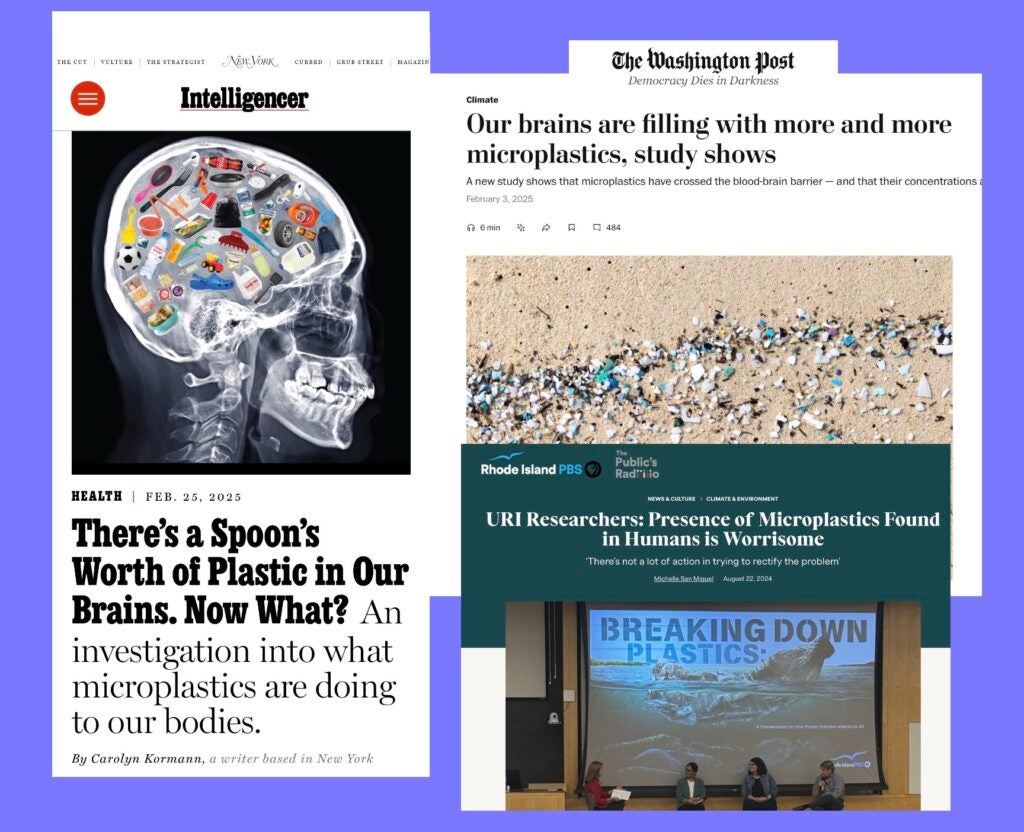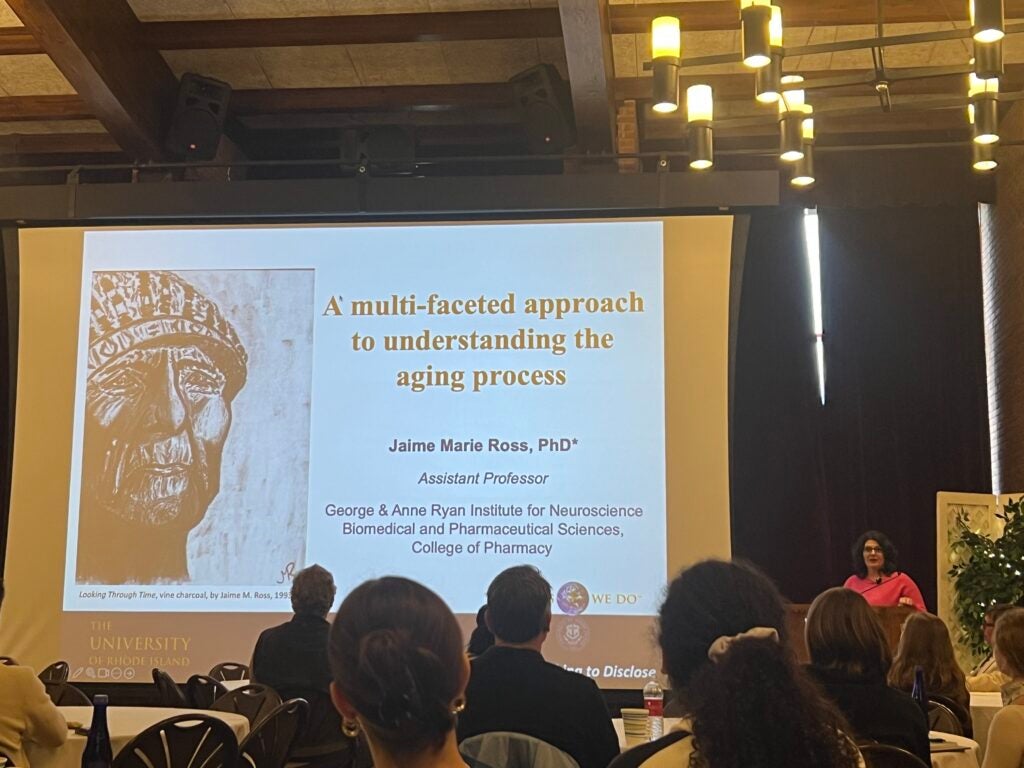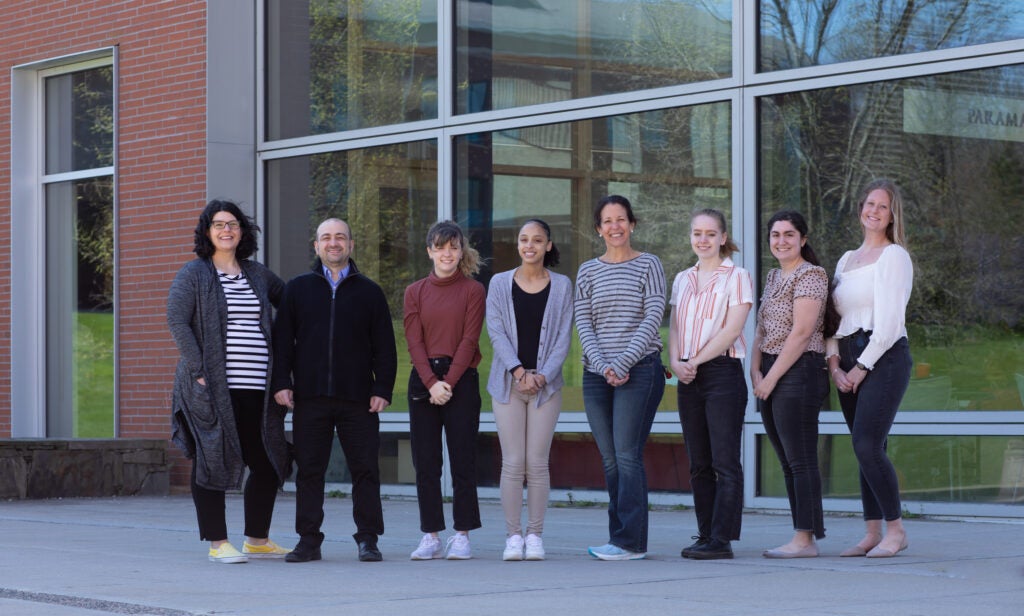
In the News
- March 2025 New York Magazine (There’s a Spoon’s Worth of Plastic in Our Brains. Now What?)
- February 2025 Business Insider (Researchers Found a Spoon of Nanoplastics in Human Brains…) and Katie Couric Media (Are Microplastics Harming Your Brain?)
- January 2025 The Washington Post (Our brains are filling with more microplastics, study shows)
- August 2025 “Rhode Island PBS Weekly” (URI Researchers: Presence of Microplastics Found in Humans is Worrisome) and Association of American Medical Colleges (Microplastics are inside us all. What does that mean for our health?)
- January 2024 “CBS Primetime News” (How tiny plastic particles may impact the body)
Additional Lab Highlights
August 2024 Drs. Ross and Coppotelli received a two-year, $433,125 NIH grant to characterize a new mouse model of mitochondrial dysfunction. The model will allow researchers to isolate mtDNA mutations within single tissues to more accurately understand the impacts on different health and disease states.
June 2024 RI-INBRE highlighted the Ross lab’s work on microplastics as part of the URI Plastics: Land to Sea Initiative. The lab was also featured in ecoRI News.
April 2024 Dr. Ross visited her alma mater, St. Lawrence University, to deliver the Richard D. Church Lecture in Neuroscience. In her lecture, Dr. Ross presented research on the impacts of environmental and lifestyle factors on mitochondrial dysfunction, epigenetics, and chronic inflammation in aging and disease states.


August 2023 Key findings from the Ross lab’s work on microplastics are published in the International Journal of Molecular Science.
June 2023 The Ross lab receives a URI Plastics Seed Grant to study the lifecycle of microplastics in the body and their impact on brain health, with Dr. Ross as principal investigator. September update: Read the official announcement.
May 2022 The Ross lab is featured in the Spring edition of URI’s Momentum magazine (“What Is the Life Cycle of Microplastics in the Body?”).
January 2022 Drs. Ross and Coppotelli are primary investigators on a $179,500 grant from the Champlin Foundation to acquire high-precision Laser Capture Microdissection technology that enables researchers to isolate and study individual cells or cell structures in tissue, cell, and other biological samples. Its use will provide essential workforce training to neuroscience, pharmacy, engineering, biological science, and bioinformatics students.
November 2021 Dr. Ross took part in the URI Foundation and Alumni Engagement’s Faculty Office Hour series with a special presentation on “How to Age with a Youthful Brain”:
September 2021 Read a Q&A with Dr. Ross, who presented “A Multifaceted Approach to Identify Underlying Molecular Mechanisms, Biomarkers, and Therapies for Aging and Neurogenerative Disease,” as part of the Neuroscience Seminar Series, jointly sponsored by the Ryan Institute and the Interdisciplinary Neuroscience Program.
August 2021 Dr. Ross was named an Early Career Investigator for the 2021–2022 Interstellar Initiative, presented by the New York Academy of Sciences and the Japan Agency for Medical Research and Development. This year’s event will focus on challenges in healthy longevity. The annual Interstellar Initiative brings together early career scientists around the world for a two-day workshop that fosters interdisciplinary mentorship, networking, and collaboration.
April 2021 (Video below) An interview with Dr. Ross and collaborators Malin Hernebring, Ph.D. and Julia Adelof, Ph.D. of the University of Gothenburg in Sweden, discussing their recent publication in Aging, “Conclusions from a behavioral aging study on male and female F2 hybrid mice on age-related behavior, buoyancy in water-based tests, and an ethical method to assess lifespan.”
March 2021 Dr. Ross was awarded grant from the Rhode Island Foundation to collect preliminary data for a project focused on lifestyle factors that contribute to Alzheimer’s disease.
Graduate INP student and Ross Lab member Sydney Bartman was part of an interactive video lesson on executive function (“Multitasking and the Brain”) for Brain Week Rhode Island’s “Brainy Adventure” online school visit series.
August 2020 Drs. Ross and Coppotelli is awarded a three-year, $747,000 grant from the National Institute on Aging (R00, NIH Pathways to Independence Award) on the role of epigenetics in age-related cognitive decline and Alzheimer’s disease.
June 2020 The Ross Lab is awarded a $95,000 grant from the Fred M. Roddy Foundation to fund innovative behavioral equipment and an essential tissue preparation instrument.
March 2020 Video update from The Ross Lab for 2020 Brain Week:
